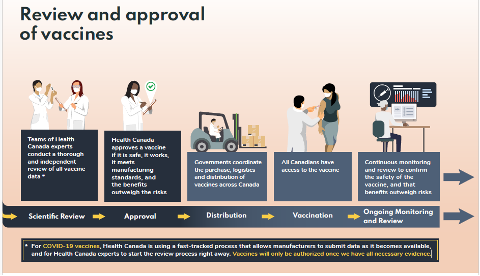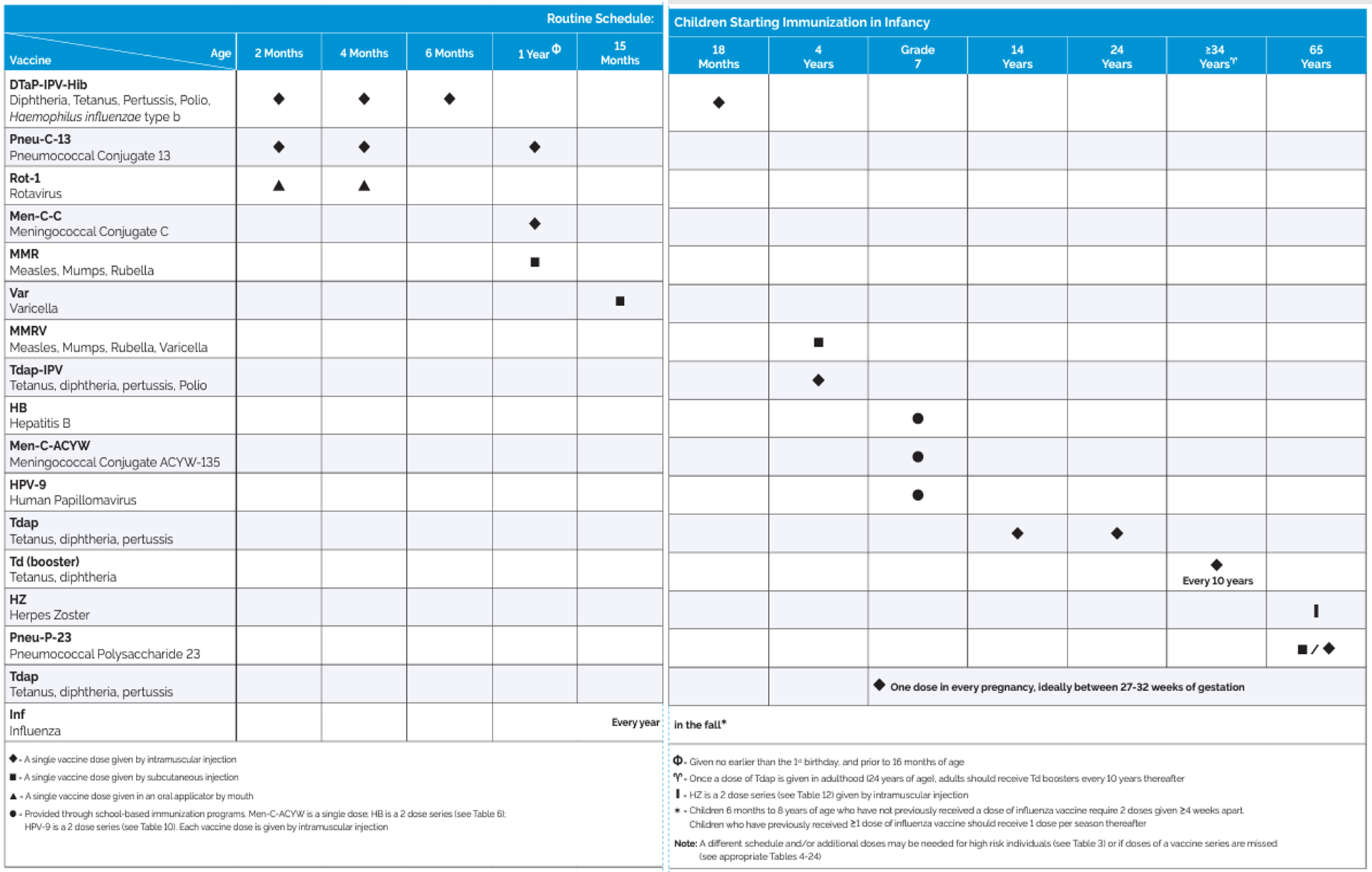Module 3.2 Immunizations
Learning Objectives
By the end of this module, you should be able to:
- Explain how immunization prevents illness.
Immunizations
Prevention of infectious disease starts with immunizations (or vaccines). Immunizations are considered the number one public health intervention of the 20th century and one of the top 10 interventions of the first decade of the 21st century.
On-time vaccination throughout childhood is essential because it helps provide immunity before children are exposed to potentially life-threatening diseases. Vaccines are tested to ensure that they are safe and effective for children to receive at the recommended ages. Vaccine-preventable diseases can be very serious, may require hospitalization, or even be deadly — especially in infants and young children.
See Appendix A at the end of this module for the Ontario Immunization Schedule.
35. (1) Every licensee shall ensure that before a child who is not in attendance at a school or private school, within the meaning of the Education Act, is admitted to a child care centre it operates or to a premises where it oversees the provision of home child care, and from time to time thereafter, the child is immunized as directed by the local medical officer of health. O. Reg. 137/15, s. 35 (1); O. Reg. 126/16, s. 24 (1); O. Reg. 254/19, s. 8 (1).
(2) Subsection (1) does not apply where a parent of the child objects to the immunization on the ground that the immunization conflicts with the sincerely held convictions of the parent’s religion or conscience or a legally qualified medical practitioner gives medical reasons to the licensee as to why the child should not be immunized. O. Reg. 137/15, s. 35 (2); O. Reg. 126/16, s. 24 (2).
(3) Objections and medical reasons under subsection (2) shall be submitted in a form approved by the Minister. O. Reg. 126/16, s. 24 (3). (O. Reg. 137/15: GENERAL)
How Vaccines Work
The immune system helps the human body fight germs by producing substances to combat them. Once it does, the immune system “remembers” the germ and can fight it again. Vaccines contain germs that have been killed or weakened. When given to a healthy person, the vaccine triggers the immune system to respond and thus build immunity.
Before vaccines, people became immune only by getting a disease and surviving it. Immunizations are an easier and less risky way to become immune.
Vaccines are the best defense we have against serious, preventable, and sometimes deadly contagious diseases. Vaccines are some of the safest medical products available, but like any other medical product, there may be risks. Accurate information about the value of vaccines as well as their possible side effects helps people to make informed decisions about vaccination.
Potential Side Effects
Vaccines, like all medical products, may cause side effects in some people. Most of these side effects are minor, such as redness or swelling at the injection site. Read further to learn about possible side effects of vaccines.
Any vaccine can cause side effects. For the most part, these are minor (for example, a sore arm or low-grade fever) and go away within a few days. Serious side effects after vaccination, such as severe allergic reaction, are very rare.
Remember, vaccines are continually monitored for safety, and like any medication, vaccines can cause side effects. However, a decision not to immunize a child also involves risk and could put the child and others who encounter them at risk of contracting a potentially deadly disease.
How Well Do Vaccines Work?
Vaccines work well to reduce the effects of the disease and to prevent the body becoming ill. No medicine is perfect, of course, but most childhood vaccines produce immunity about 90 – 100% of the time.
What about the argument made by some people that vaccines don’t work that well and that diseases would be going away on their own because of better hygiene or sanitation, even if there were no vaccines?
That simply isn’t true. Certainly, better hygiene and sanitation can help prevent the spread of disease, but the germs that cause disease will still be around, and as long as they are they will continue to make people sick.
How Are Vaccines Developed?
There are many stages and processes when creating or improving a vaccine in Canada. Vaccines are only authorized to be used on humans (age and other factors may be considered) once all necessary evidence deems it safe and effective and meets manufacturing standards. Watch how vaccines are developed.


If you look at the history of any vaccine-preventable disease, you will virtually always see that the number of cases of disease starts to drop when a vaccine is available. Vaccines are the most effective tool we have to prevent infectious diseases and reduce the symptoms.
Opposition to Vaccines
But what about people who do not want their children to receive vaccines? That question is at the heart of a debate that has been simmering for years. Vaccines are biological preparations that improve immunity against a certain disease. Vaccines have contributed to the eradication and weakening of numerous infectious diseases, including smallpox, polio, mumps, chickenpox, and meningitis.

However, many people express concern about the potential negative side effects of vaccines. These concerns range from fears about overloading the child’s immune system to controversial reports about devastating side effects of the vaccines.
Although children continue to get several vaccines up to their second birthday, these vaccines do not overload the immune system. Every day, an infant’s healthy immune system successfully fights off thousands of antigens – the parts of germs that cause their immune system to respond. Even if your child receives several vaccines in one day, vaccines contain only a tiny amount of antigens compared to the antigens your baby encounters every day.
This is the case even if your child receives combination vaccines. Combination vaccines take two or more vaccines that could be given individually and put them into one shot. Children get the same protection as they do from individual vaccines given separately—but with fewer shots.
One misapprehension is that the vaccine itself might cause the disease it is supposed to be immunizing against. Vaccines help develop immunity by imitating an infection, but this “imitation” infection does not cause illness. Instead, it causes the immune system to develop the same response as it does to a real infection so the body can recognize and fight the vaccine-preventable disease in the future. Sometimes, after getting a vaccine, the imitation infection can cause minor symptoms, such as fever. Such minor symptoms are normal and should be expected as the body builds immunity.
Another commonly circulated concern is that vaccinations, specifically the MMR vaccine (MMR stands for measles, mumps, and rubella), are linked to autism. The autism connection has been particularly controversial. In 1998, a British physician named Andrew Wakefield published a study in Great Britain’s Lancet magazine that linked the MMR vaccine to Autism. The report received a lot of media attention, resulting in British immunization rates decreasing from 91 percent in 1997 to almost 80 percent by 2003, accompanied by a subsequent rise in measles cases (Devlin 2008). A prolonged investigation by the British Medical Journal proved that not only was the link in the study nonexistent, but that Dr. Wakefield had falsified data to support his claims. Dr. Wakefield was discredited and stripped of his license, but the doubt still lingers in many parents’ minds.
Other parents choose not to vaccinate for various reasons including religious and health beliefs.
What about the Flu Vaccine?
There are many reasons to get an influenza (flu) vaccine each year. Below is a summary of the benefits of flu vaccination:
- Flu vaccination can keep you from getting sick with flu.
- Flu vaccination can reduce the risk of flu-associated hospitalization.
- Flu vaccination is an important preventive tool for people with chronic health conditions.
- Flu vaccination helps protect women during and after pregnancy and helps protect the baby from flu for several months after birth.
- Flu vaccination can be lifesaving in children.
- Flu vaccination has been shown in several studies to reduce the severity of illness in people who get vaccinated but still get sick.
- Getting vaccinated yourself may also protect people around you, including those who are more vulnerable to serious flu illness, like babies and young children, older people, and people with certain chronic health conditions.
What about the COVID-19 Vaccine?
Most children who get COVID-19 experience mild or no symptoms at all. However, children with some underlying medical conditions are at higher risk of becoming seriously ill including, but not limited to, children who are immunocompromised, have Down Syndrome, asthma, or are obese (Government Canada, 2023).
In Canada, all children over the age of 6 months are eligible to receive the COVID-19 vaccine. Children aged 6 months to four years are only eligible for the primary series of two immunizations. At the time of writing, a booster dose is not approved for this age group (Government of Ontario, 2023).
Children and youth 5 years of age and older are eligible for booster shots. A booster shot should be administered no sooner than 2 months after a child displayed symptoms of COVID-19 or tested positive (Government of Ontario, 2023).
Pause to Reflect 💭
Using the information that has been provided about immunizations, think of ways you could respond to the following situations:
“I don’t believe in giving all the vaccines, like chicken pox. It’s better for children to just get the disease like we all did when we were kids.”
“Why do they have to give vaccines so early? It seems like it’s too much, too quickly.”
“I have heard that vaccines give some kids autism. And even if they don’t, the side effects are just too scary.”
Important Things to Remember
- Some vaccines are the only protection against diseases that have no treatment or cure.
- On-time vaccination throughout childhood is essential because it helps provide immunity before children are exposed to potentially life-threatening diseases.
- Vaccines contain germs that have been killed or weakened. When given to a healthy person, the vaccine triggers the immune system to respond and thus build immunity.
- Vaccines work well to reduce the effects of the disease and to prevent the body becoming ill.
Resources for Further Exploration
Vaccination and your child (SickKids)
References
- Government of Canada (2023). Vaccines for children: Covid-19 vaccination. https://www.canada.ca/en/public-health/services/vaccination-children/covid-19.html
- Government of Ontario (2023). COVID-19 vaccines. https://www.ontario.ca/page/covid-19-vaccines
Appendix A: Ontario Immunization Schedule |
Taken from the Government of Ontario


